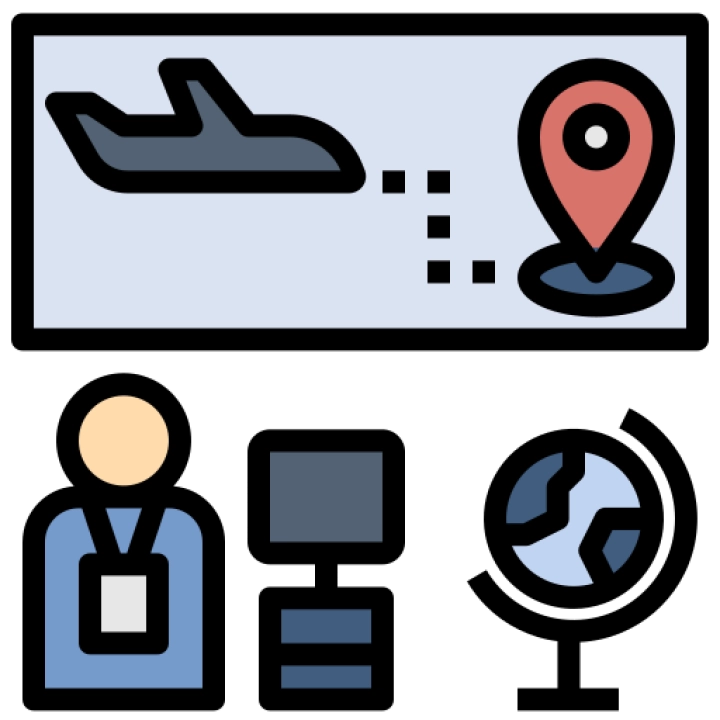College: Professional School
This program provides a comprehensive understanding of the principles and practices of aviation operations management.
Students explore key areas such as aviation safety, flight planning, air traffic control, and aircraft maintenance.
The program focuses on technical skills, precision, and the application of aviation principles to manage aviation operations, ensure safety, and improve efficiency.
Graduates are prepared for careers in airlines, airports, aviation authorities, and related industries.
Learning Objectives:
- Understand the fundamentals of aviation and aviation operations management.
- Develop skills in flight planning, navigation, and air traffic control.
- Learn techniques for maintaining aviation safety and quality control.
- Explore the role of aviation operations management in aviation safety, efficiency, and industry regulations.
- Understand the principles of data analysis and reporting in aviation settings.
- Analyze challenges and opportunities in the field of aviation operations management.
- Develop teamwork and problem-solving skills in the aviation field.
Main Curriculum:
- Introduction to Aviation Operations Management - Overview of the field, its history, and its applications in aviation.
- Aviation Safety and Regulations - Study of safety protocols, risk management, and regulatory considerations in aviation. - Techniques to ensure a safe and compliant aviation environment.
- Flight Planning and Navigation - Basics of flight planning, including route selection, fuel management, and weather analysis. - Techniques for piloting aircraft using modern electronics and traditional methods.
- Air Traffic Control and Management - Principles of air traffic control, including communication, coordination, and conflict resolution. - Techniques for managing air traffic in different scenarios.
- Aircraft Maintenance and Engineering - Study of aircraft systems, maintenance schedules, and engineering principles. - Techniques for conducting inspections and maintaining aircraft airworthiness.
- Quality Control and Assurance in Aviation - Fundamentals of quality control procedures and standards in aviation environments. - Techniques to ensure accuracy and reliability in aviation operations.
- Data Analysis and Aviation Information Systems - Principles of collecting, analyzing, and reporting data in aviation. - Techniques for using aviation information management systems.
- Specialized Aviation Techniques - Exploration of advanced technologies such as performance-based navigation, satellite-based augmentation systems, and unmanned aerial vehicles. - Techniques for applying specialized methods in aviation operations.
- Emerging Trends in Aviation Operations Management - Analysis of innovations such as automation, artificial intelligence, and advanced air mobility. - Techniques for adapting to new trends and technologies in the field.
- Capstone Project in Aviation Operations Management - Real-world project to apply acquired skills in aviation operations management, safety, or efficiency. - Techniques for providing a comprehensive aviation solution.
Evaluation Methods:
- Flight simulation exercises and practical assessments.
- Written assignments on aviation techniques, safety, and data analysis.
- Group projects in aviation research and quality control.
- Participation in internships or fieldwork with airlines, airports, or aviation authorities.
Recommended Textbooks:
- "Aviation Safety: Investigating Accidents and Preventing Them" by Jay M. Smith and Melvin J. Haas.
- "Aviation Operations Management: A Practical Guide" by John Wensveen.
- "Aircraft Systems: Principles and Integration" by Ian Moir and Allan Seabridge.
- "Air Traffic Control: Principles, Procedures, and Facilities" by David J. Hurst and Michael J. Garret.
Prerequisites:
Basic knowledge of physics, mathematics, and geography is recommended. Suitable for students in aviation, engineering, and related fields.
Program Duration:
Typically two to four years, depending on the program, including coursework, practical training, and internships.
Certification:
Graduates may earn a degree in aviation operations management or a related field and seek additional certifications (e.g., air traffic controller, FAA certifications).
Target Audience:
Aspiring aviation professionals, flight dispatchers, and air traffic controllers seeking specialization in aviation operations management, safety, and efficiency.
This specialization equips students with the technical, analytical, and practical skills necessary to excel in aviation operations management, supporting advancements in aviation safety, efficiency, and industry regulations.


